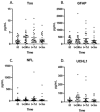Observational study of long-term persistent elevation of neurodegeneration markers after cardiac surgery
- PMID: 31073130
- PMCID: PMC6509119
- DOI: 10.1038/s41598-019-42351-2
Observational study of long-term persistent elevation of neurodegeneration markers after cardiac surgery
Abstract
Surgery and anesthesia induce inflammatory changes in the central nervous system, which ultimately lead to neuronal damage concomitant with an increase in the level of neurodegeneration markers. Despite some experimental data showing prolonged activation of the immune system post-surgery, no study has determined the extent of long-term elevation of neurodegeneration markers. The purpose of this study was to investigate the serum levels of tau protein, ubiquitin carboxyl-terminal hydrolase L1 (UCH-L1), neurofilament light (NF-L), and glial fibrillary acidic protein (GFAP) after elective cardiac surgery with the implementation of cardiopulmonary bypass (CPB). The serum levels of these markers from 30 patients were compared longitudinally to the baseline (pre-surgery or t0), at 24 hours (t+24), at 7 days (t+7d), and at 3 months (t+3m). The secondary outcome was the production of macrophage-colony stimulating factor (M-CSF) and tumor necrosis factor-α (TNF-α) in vitro by isolated monocytes in response to lipopolysaccharide (LPS) as the measure of immune system activation. The tertiary outcome was the serum level of C-reactive protein (CRP), serum amyloid P (SAP), and α-2-macroglobulin (A2M). Serum levels of tau protein increased 24 hours after surgery (p = 0.0015) and remained elevated at 7 days (p = 0.0017) and three months (p = 0.036). Serum levels of UCH-L1 peaked at 24 hours (p = 0.00055) and normalized at 3 months. In vitro secretion of M-CSF by LPS-stimulated peripheral monocytes, but not TNFα, correlated highly (r = 0.58; p = 0.04) with persistent elevation of serum tau levels at 3 months. The serum CRP and SAP increases correlated with tau post-CPB levels significantly at 3 months. We demonstrated that elevation of serum tau levels at 24 hours, 7 days, and 3 months after heart surgery is concomitant with some traits of inflammation after CPB. The elevation of tau several weeks into recovery is significantly longer than expected.
Conflict of interest statement
The authors declare no competing interests.
Figures




Similar articles
-
High Levels of NfL, GFAP, TAU, and UCH-L1 as Potential Predictor Biomarkers of Severity and Lethality in Acute COVID-19.Mol Neurobiol. 2024 Jun;61(6):3545-3558. doi: 10.1007/s12035-023-03803-z. Epub 2023 Nov 24. Mol Neurobiol. 2024. PMID: 37996731 Free PMC article.
-
Acute Effects of Sport-Related Concussion on Serum Glial Fibrillary Acidic Protein, Ubiquitin C-Terminal Hydrolase L1, Total Tau, and Neurofilament Light Measured by a Multiplex Assay.J Neurotrauma. 2020 Jul 1;37(13):1537-1545. doi: 10.1089/neu.2019.6831. Epub 2020 Mar 13. J Neurotrauma. 2020. PMID: 32024456
-
Time course and diagnostic utility of NfL, tau, GFAP, and UCH-L1 in subacute and chronic TBI.Neurology. 2020 Aug 11;95(6):e623-e636. doi: 10.1212/WNL.0000000000009985. Epub 2020 Jul 8. Neurology. 2020. PMID: 32641529 Free PMC article.
-
A Serum Protein Biomarker Panel Improves Outcome Prediction in Human Traumatic Brain Injury.J Neurotrauma. 2019 Oct 15;36(20):2850-2862. doi: 10.1089/neu.2019.6375. Epub 2019 Jun 19. J Neurotrauma. 2019. PMID: 31072225 Free PMC article.
-
Neurological biomarkers in the perioperative period.Br J Anaesth. 2011 Dec;107(6):844-58. doi: 10.1093/bja/aer338. Epub 2011 Nov 6. Br J Anaesth. 2011. PMID: 22065690 Review.
Cited by
-
CHIP Decline Is Associated With Isoflurane-Induced Neurodegeneration in Aged Mice.Front Neurosci. 2022 Mar 18;16:824871. doi: 10.3389/fnins.2022.824871. eCollection 2022. Front Neurosci. 2022. PMID: 35368262 Free PMC article.
-
Identification of risk factors for delirium, cognitive decline, and dementia after cardiac surgery (FINDERI-find delirium risk factors): a study protocol of a prospective observational study.BMC Cardiovasc Disord. 2022 Jun 30;22(1):299. doi: 10.1186/s12872-022-02732-4. BMC Cardiovasc Disord. 2022. PMID: 35773648 Free PMC article.
-
Impact of Intraoperative Blood Transfusion on Cerebral Injury in Pediatric Patients Undergoing Congenital Septal Heart Defect Surgery.J Clin Med. 2024 Oct 11;13(20):6050. doi: 10.3390/jcm13206050. J Clin Med. 2024. PMID: 39458000 Free PMC article.
-
Evaluating Neurological Biomarkers in Serum After Major Cardiac Surgery: A Study of Tau, Neurofilament Light Chain, Glial Fibrillary Acidic Protein, and Ubiquitin C-terminal Hydrolase L1.Anesth Analg. 2024 Nov 1;139(5):1122-1124. doi: 10.1213/ANE.0000000000007053. Epub 2024 Aug 1. Anesth Analg. 2024. PMID: 39088364 No abstract available.
-
Neurofilament light: a narrative review on biomarker utility.Fac Rev. 2021 May 7;10:46. doi: 10.12703/r/10-46. eCollection 2021. Fac Rev. 2021. PMID: 34131656 Free PMC article. Review.
References
Publication types
MeSH terms
Substances
Grants and funding
LinkOut - more resources
Full Text Sources
Medical
Research Materials
Miscellaneous

